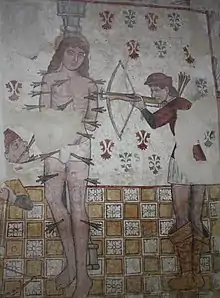bésta
See also: besta
Galician

15th-century depiction. Santa María de Labrada, Guitiriz, Galicia.
Etymology
From Old Galician and Old Portuguese baesta (“crossbow”) (13th century, Cantigas de Santa Maria), from Latin ballista, from Ancient Greek βαλλίστρα (ballístra). Cognate with Portuguese besta and Spanish ballesta.
Pronunciation
- IPA(key): /ˈbɛsta̝/
Noun
bésta f (plural béstas)
- crossbow
- 1295, R. Lorenzo (ed.), La traducción gallega de la Crónica General y de la Crónica de Castilla. Ourense: I.E.O.P.F., page 17:
- et da Torre do Ouro esso meesmo, cõ tra[bu]quetes que y tĩjnã, que os aqueixauã ademays, et cõ beestas de torno et de outras muytas maneyras
- And the same from the Torre del Oro [a castle in Seville]: they were attacking them with little catapults and winched crossbows, and in many other ways
- et da Torre do Ouro esso meesmo, cõ tra[bu]quetes que y tĩjnã, que os aqueixauã ademays, et cõ beestas de torno et de outras muytas maneyras
- 1295, R. Lorenzo (ed.), La traducción gallega de la Crónica General y de la Crónica de Castilla. Ourense: I.E.O.P.F., page 17:
- hock (the tarsal joint of a digitigrade quadruped)
Derived terms
- besteiro
- Besteiros
- Bestilleiros
References
- “baesta” in Dicionario de Dicionarios do galego medieval, SLI - ILGA 2006-2012.
- “beest” in Xavier Varela Barreiro & Xavier Gómez Guinovart: Corpus Xelmírez - Corpus lingüístico da Galicia medieval. SLI / Grupo TALG / ILG, 2006-2016.
- “bésta” in Tesouro informatizado da lingua galega. Santiago: ILG.
- “bésta” in Álvarez, Rosario (coord.): Tesouro do léxico patrimonial galego e portugués, Santiago de Compostela: Instituto da Lingua Galega.
This article is issued from Wiktionary. The text is licensed under Creative Commons - Attribution - Sharealike. Additional terms may apply for the media files.